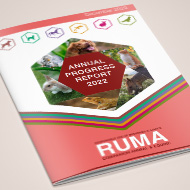
The report details national metrics for measuring antibiotic use in dogs and cats.
The RUMA Companion Animal and Equine Alliance (RUMA C&E) has released its first Annual Progress Report detailing national metrics for measuring antibiotic use in dogs and cats.
Highlighting 12 months of work by the newly-formed RUMA CA&E Targets and Measures Working Group (T&MWG), the report also identifies four priority areas for tackling antibiotic use in companion animals, including:
- cat bite acscess
- kennel cough
- acute diarrhoea
- cat flu.
The scenarios are based on areas where there is thought to be the most scope for improving antibiotic stewardship, especially when using the Highest Priority Critically Important Antibiotics.
Established in 2020, the RUMA C&E was formed to define the principles of responsible use of medicines in the companion animal and equine sectors, with a view to positively contributing to the One Health Agenda. With input from stakeholders, including the T&MWG, the report identifies three focus areas for measuring antibiotic use in dogs and cats, namely:
- reducing the inappropriate use of antibiotics in the companion animal sector at a national and practice level
- data collection and protocols at a practice level
- promoting best practice and knowledge exchange.
RUMA CA&E chair Gwyn Jones, said: “These are important building blocks we are putting in place which will provide benchmarks and baselines, and in time, evidence of progress towards achieving the Government’s 20-year vision and five-year national plan for how the UK will contribute to containing and controlling AMR.
“Whilst we acknowledge there are many complex challenges to take into account across the companion animal and equine sectors when it comes to antibiotic stewardship, what is recognised is the opportunity that exists to make a positive impact on AMR and protect the role of antibiotics in both human and animal health for the future.”
The findings of the report will help inform the foundation of ongoing work, including the creation of an Independent Scientific Group (ISC), understanding the capabilities for standardising data and recording drug availability and prevalence data on conditions that require antibiotics.
The full report is available at rumacae.co.uk
Image (C) RUMA.



 BSAVA is to partner with BVA Live (11-12 June 2026) to champion clinical research.
BSAVA is to partner with BVA Live (11-12 June 2026) to champion clinical research.